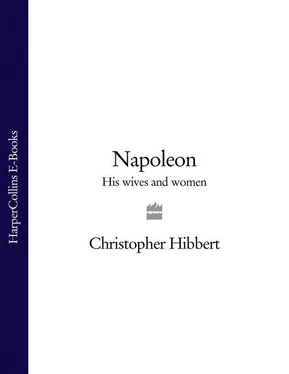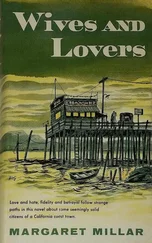One day his parents came to see him. His father, wearing a smart, new wig, was an embarrassing sight, bowing in an extravagantly polite way when he stood aside to allow the headmaster to pass first through a door. But his mother was all that a boy – a Corsican boy in an academy attended by so many French cadets from upper-class families – could hope to have. Her long dark hair was tied back in a chignon and covered by a lace headdress, and her dress was of white silk with a pattern of green flowers. She was not feeling well, however, having recently suffered from puerperal fever. She still had cause to complain of intermittent pain on her left side, an ailment which her husband hoped would be alleviated by a course of the waters at Bourbonne.
She heard with dismay that Napoleon had now set his heart on going into the navy and, as a preparation for life at sea, had taken to sleeping in a hammock in his cubicle. She anxiously pointed out the twin dangers of a life at sea: the chances of being killed on board and of being drowned if thrown into the water. When she returned to Ajaccio she asked the comte de Marbeuf to do all he could to dissuade her son from fulfilling his youthful ambition.
Letizia was also worried by the state of her husband’s health: he had lately lost much weight and had little appetite; he looked exhausted and his skin was discoloured by blotchy patches. Carlo was persuaded to go to Aix, then to Montpellier, to seek specialist advice. None of any use was given him: he died of cancer of the stomach in February 1785, a month before his thirty-ninth birthday, seized at the end, so Napoleon was later to say, with a passion for priests: ‘There were not enough for him in all Montpellier…He ended his life so pious that everyone there thought him a saint.’
Napoleon had by then left Brienne and, no longer set upon a career in the navy, had gone on to the École Militaire in Paris, an establishment which set almost as much store by religious observances as by military training: attendance at Mass was compulsory; so were confirmation and confession.
Napoleon was distressed to hear of his father’s death and worried that his mother, a widow with eight children, would find it hard to get by in her straitened circumstances. When someone offered to lend him money, he declined the offer with the words, ‘My mother has too many expenses already, I must not add to them.’
He was as proud and as priggish as ever, just as intolerant of criticism and of what he took to be slights to his amour propre , furious when he was made to feel foolish – as, for instance, when, never having seen ice before, he demanded to know who was putting glass in his water jug.
Stories were told of his throwing his musket at the head of a senior cadet who, having noticed a mistake in Napoleon’s drill, had rapped him over the knuckles, and of his rejecting the overtures of a former friend, Pierre François Laugier, son of a baron, whom he had criticized for associating with young men of homosexual tendencies. ‘Your new friends are corrupting you,’ he told Laugier. ‘So make a choice between them and me.’ Later he said, ‘You have scorned my advice, and you have renounced my friendship. Never speak to me again.’ Laugier’s response was to creep up behind him and push him over, upon which Napoleon ran after him and, grabbing him by the collar, threw him to the floor on which he hit his head against a stove.
‘I was insulted,’ Napoleon told the captain on duty who came up to admonish him. ‘I took my revenge. There is nothing more to be said.’ He then strode off in a manner which by then had become characteristic, his arms folded, his head bent forwards, taking long steps.
The sexual proclivities of Laugier induced Napoleon to write a paper to be sent to the Minister of War on the subject of the education of the young men of Sparta which, he thought, should be applied in the École Militaire and other French academies. He sent a draft to the headmaster of the school at Brienne who, having read it, advised him not to pursue the matter further.
A report on the Corsican cadet at the École Militaire described him as ‘solitary, haughty, egotistical…Reserved and studious, he prefers study to any kind of amusement…He enjoys reading good authors and has a sound knowledge of mathematics and geography…He is most proud and ambitious.’
5 A PROSTITUTE AND A PEST
‘A woman who is feared has no charm.’
NAPOLEON WAS NOW SIXTEEN YEARS OLD. His relations with women had, up till now, been largely limited to those with members of his own family and their friends; and he had had little opportunity of coming across girls of his own age. On holiday in Paris, however, he saw something of the two daughters of Panoria Permon, a Corsican of Greek descent, the attractive wife of an army contractor and the mother of two young daughters, Cécile and Laure. When Napoleon was commissioned soon after his sixteenth birthday, he called at the Permons’ house in the Place de Conti in his new officer’s uniform and long black boots which looked far too big for his painfully thin legs. The girls laughed at the sight of him; and since he was obviously put out by this unwelcome reception and seemed unable then, as always, to tolerate a joke at his own expense, Cécile told him that, now he was entitled to wear an officer’s sword, he must use it to protect the ladies and not mind if they teased him.
‘It’s obvious you’re just a little schoolgirl,’ Napoleon said grumpily.
‘What about you?’ the ten-year-old girl replied. ‘You’re just a puss-in-boots.’
In an attempt to show there was no ill feeling, however, the next time he called at the house, Napoleon brought with him a copy of Puss-in-Boots for one of the sisters and, for the other, a model which he had had made, though he could ill afford it, of Puss , running in front of the carriage of his master, the marquis de Carabas. Their mockery was not forgotten, however: for years thereafter Laure Permon was known by Napoleon as his ‘little pest’ and, a whole decade later, when she made some reference to the Puss-in-Boots episode, Laure said she would never forget Napoleon’s expression, as he came up to her to pinch her nose so hard that she cried out in pain. ‘You’re witty, you little pest,’ he said, ‘but you’re malicious. Don’t be that. A woman who is feared has no charm.’ Napoleon neither then nor later ever forgot a slight. Nor could Laure Permon ever forget the disdainful twist of his mouth when he was angry, nor yet his charm when he chose to exercise it.
Equipped with his sword and his boots, Napoleon had now to decide which regiment he should apply to join. He selected La Fère, a well-regarded artillery regiment stationed at Valence on the Rhône between Marseilles and Lyon, the nearest garrison town to Corsica.
In Valence he lived in a first-floor room in a house belonging to a fifty-year-old woman, Mme Bou. It was a small and by no means quiet room in which could clearly be heard the click of billiard balls in the room next door, the saloon of the Café Cercle. But he liked Mme Bou, who did his washing for him and mended his clothes, and life in Valence was generally pleasant enough: together with his fellow young officers he was invited to the houses of the local gentry. He rarely accepted these invitations, though, feeling he would be out of place, de trop . He found the money for a course of dancing lessons. He also scraped together the money to reimburse his mother for the postage of the clothes she sent him. He had little money to spare, however; and he would always borrow a book if he could, rather than buy one.
In the loneliness of his room, he was often desperately unhappy, even suicidal. ‘Always alone,’ he wrote, ‘in the throes of my melancholy my thoughts dwell on death…What great rage brings me now to wish for my destruction…I see no place for me in this world…As I must die sooner or later, why should I not kill myself?’
Читать дальше











